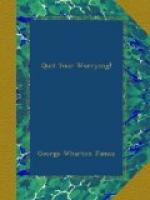We are told that all these imaginary ills come from physical causes. The hypochondrium is supposed to be affected, and as it is located under the “short ribs,” the hypochondriac continuously suffers from that awful “sinking at the pit of the stomach” that makes him feel as if the bottom had dropped out of life itself. He can neither eat, digest his food, walk, sit, rest, work, take pleasure, exercise, or sleep. His body is the victim of innumerable ills. His tongue, his lips, his mouth are dry and parched, his throat full of slime and phlegm, his stomach painful, his bowels full of gas, and he regards himself as cursed of God—a walking receptacle of woe. To physician, wife, husband, children, employer, employee, pastor, and friend alike the hypochondriac is a pest, a nuisance, a chill and almost a curse, and, poor creature, these facts do not take away or lessen our sympathy for him, for, though most of his ills are imaginary, he suffers more than do those who come in contact with him.
Then there is the neurasthenic—the mentally collapsed whose collapse invariably comes from too great tension or worry. I know several housewives who became neurasthenic by too great anxiety to keep their houses spotless. Not a speck of dust must be anywhere. The slightest appearance of inattention or carelessness in this matter was a great source of worry, and they worried lest the maid fail to do her duty.
I know another housewife who is so dainty and refined that, though her husband’s income is strained almost to the breaking point, she must have everything in the house so dainty and fragile that no ordinary servant can be trusted to care for the furniture, wash the dishes, polish the floors, etc., and the result is she is almost a confirmed neurasthenic because, in the first place, she worries over her dainty things, and, secondly, exhausts herself in caring for these unnecessarily fragile household equipments.
Every neurasthenic is a confirmed worrier. He ever sits on the “stool of repentance,” clothing himself in sackcloth and ashes for what he has done or not done. He cries aloud—by his acts—every five minutes or so: “We have done those things which we ought not to have done and have left undone those things which we ought to have done, and there is no health in us.” Everything past is regretted, everything present is in doubt, and nothing but anxieties and uncertainties meet the future. If he holds a position of responsibility he asks his subordinates or associates to perform certain services and then “worries himself to death,” watching to see that they “do it right,” or afraid lest they forget to do it at all. He wakes up from a sound sleep in dread lest he forgot to lock the door, turn out the electric light in the hall, or put out the gas. He becomes the victim of uncertainty and indecision. He fears lest he decide wrongly, he worries that he hasn’t yet decided, and yet having thoroughly argued a matter out and come to a reasonable conclusion, allows his worries to unsettle him and is forever questioning his decision and going back to revise and rerevise it. Whatever he does or doesn’t do he regrets and wishes he had done the converse.




